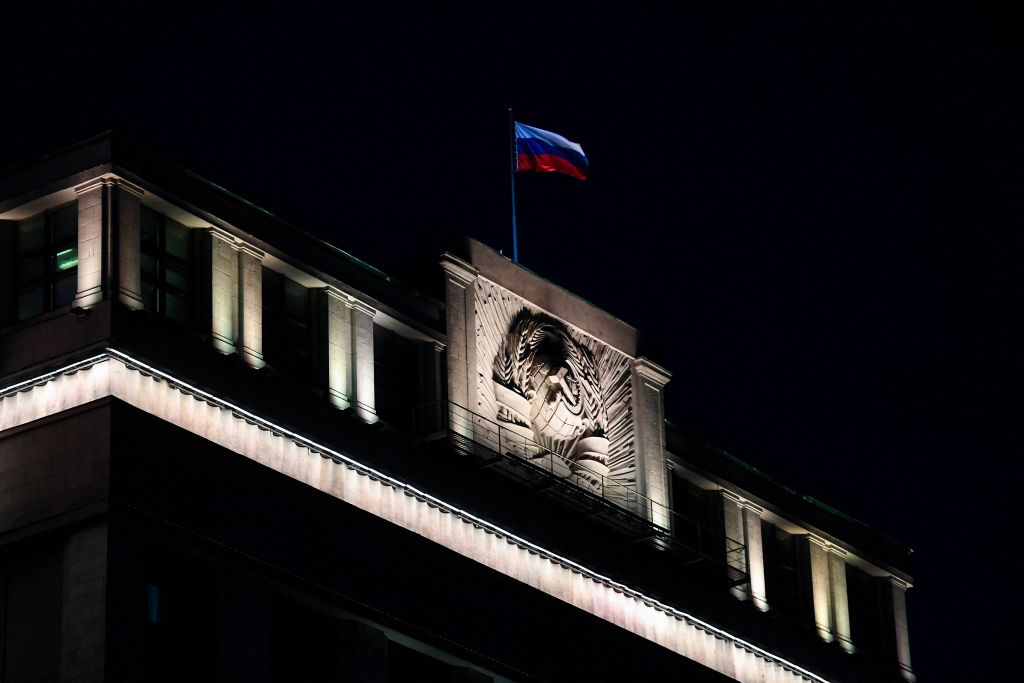Russians could face jail time for spreading 'fake' news about the military, parliament votes


A free daily email with the biggest news stories of the day – and the best features from TheWeek.com
You are now subscribed
Your newsletter sign-up was successful
Russian lawmakers on Friday unanimously passed legislation punishing those who intentionally spread "fake" news regarding the country's military with up to 15 years of jail time, Reuters and The Moscow Times report.
Lawmakers also imposed fines for those who publicly call for sanctions against Russia.
Russian officials have repeatedly claimed that the country's enemies — like the U.S. and its Western allies — have been spreading false information to "sow discord among the Russian people," Reuters writes.
The Week
Escape your echo chamber. Get the facts behind the news, plus analysis from multiple perspectives.

Sign up for The Week's Free Newsletters
From our morning news briefing to a weekly Good News Newsletter, get the best of The Week delivered directly to your inbox.
From our morning news briefing to a weekly Good News Newsletter, get the best of The Week delivered directly to your inbox.
"Literally by tomorrow, this law will force punishment - and very tough punishment - on those who lied and made statements which discredited our armed forces," said Duma chairman Vyacheslav Volodin of the law, per Reuters. The Duma is the lower house of parliament in Russia.
Those found guilty of disseminating qualifying "false information" may face up to three years in prison or a 1.5 million ruble fine; for those guilty of using an "official position" to spread "false information," the punishment increases to 5 to 10 years in prison and a fine up to 5 million rubles, Variety writes per Russian news agency TASS.
"If the fake information caused serious consequences, the term of imprisonment will be from 10 to 15 years," TASS explains, per Variety.
The legislation was reportedly approved by both houses of parliament, says The Associated Press, and "is now set to be signed into law by President Vladimir Putin to take effect as soon as Saturday."
A free daily email with the biggest news stories of the day – and the best features from TheWeek.com
Russian media outlets have also been told to refer to the ongoing invasion as a "special military operation," and to only use officially sanctioned sources when reporting on Ukraine, Variety adds.
The new censorship law arrives after the country's communication watchdog blocked multiple foreign media outlets — like BBC, Voice of America, and Deutsche Welle — for spreading "fake" information, Axios notes.
Brigid Kennedy worked at The Week from 2021 to 2023 as a staff writer, junior editor and then story editor, with an interest in U.S. politics, the economy and the music industry.
-
 The 8 best TV shows of the 1960s
The 8 best TV shows of the 1960sThe standout shows of this decade take viewers from outer space to the Wild West
-
 Microdramas are booming
Microdramas are boomingUnder the radar Scroll to watch a whole movie
-
 The Olympic timekeepers keeping the Games on track
The Olympic timekeepers keeping the Games on trackUnder the Radar Swiss watchmaking giant Omega has been at the finish line of every Olympic Games for nearly 100 years
-
 The mission to demine Ukraine
The mission to demine UkraineThe Explainer An estimated quarter of the nation – an area the size of England – is contaminated with landmines and unexploded shells from the war
-
 The secret lives of Russian saboteurs
The secret lives of Russian saboteursUnder The Radar Moscow is recruiting criminal agents to sow chaos and fear among its enemies
-
 Is the 'coalition of the willing' going to work?
Is the 'coalition of the willing' going to work?Today's Big Question PM's proposal for UK/French-led peacekeeping force in Ukraine provokes 'hostility' in Moscow and 'derision' in Washington
-
 Ukraine: where do Trump's loyalties really lie?
Ukraine: where do Trump's loyalties really lie?Today's Big Question 'Extraordinary pivot' by US president – driven by personal, ideological and strategic factors – has 'upended decades of hawkish foreign policy toward Russia'
-
 What will Trump-Putin Ukraine peace deal look like?
What will Trump-Putin Ukraine peace deal look like?Today's Big Question US president 'blindsides' European and UK leaders, indicating Ukraine must concede seized territory and forget about Nato membership
-
 Ukraine's disappearing army
Ukraine's disappearing armyUnder the Radar Every day unwilling conscripts and disillusioned veterans are fleeing the front
-
 Cuba's mercenaries fighting against Ukraine
Cuba's mercenaries fighting against UkraineThe Explainer Young men lured by high salaries and Russian citizenship to enlist for a year are now trapped on front lines of war indefinitely
-
 Ukraine-Russia: are both sides readying for nuclear war?
Ukraine-Russia: are both sides readying for nuclear war?Today's Big Question Putin changes doctrine to lower threshold for atomic weapons after Ukraine strikes with Western missiles
